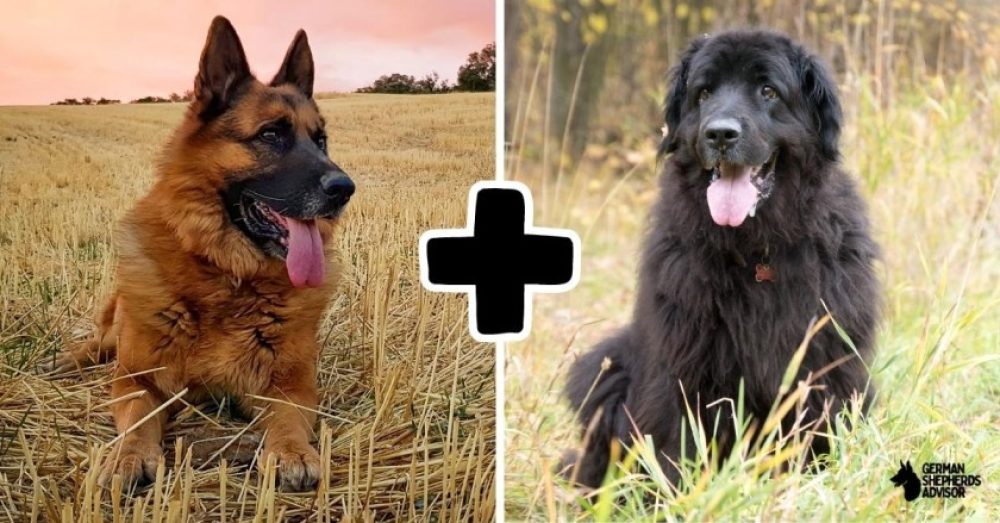People often confuse the Newfoundland and the German shepherd dog. They can be easily distinguished as they look so different from each other. Both are large dogs, but the Newfoundlands are bigger than their counterparts. Their height is around 26–30 inches while it weighs around 100–150 pounds. German Shepherd Newfoundland mix is a loving companion that makes an excellent pet for active families or people who desire a loyal and protective dog.
In this article, we will explore all that you need to know about this remarkable mix, from his looks to his personality to his exercise requirements.
German Shepherd Newfoundland Mix (Shepherd Newfie) – At a glance
| Weight: | 80–150 pounds. |
| Height: | 24–29 inches at the shoulder. |
| Lifespan: | 9–12 years. |
| Coat colours: | Black (common with Newfoundland genes), sable or tan with black markings, brown, gray, or bi-color patterns are also possible. |
| Grooming: | Brush 2-3 times per week to manage shedding, Bathe every 6-8 weeks or as needed. |
| Temperament: | Gentle and protective, intelligent and trainable, social and friendly. |
| Exercise: | 60–90 minutes of daily exercise. |
| Suitable for: | Experienced dog owners (active individual or active family) |
Parent breeds overview: German Shepherd and Newfoundland dog
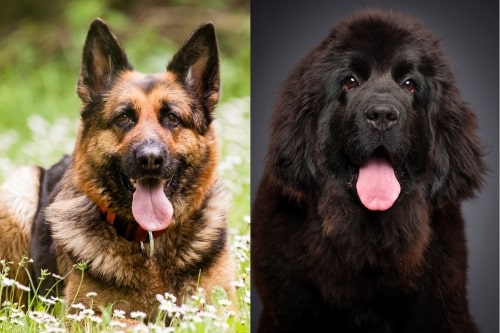
Both breeds complement each other perfectly, resulting in a hybrid that has the intelligence, loyalty, and agility of the German Shepherd, combined with the gentleness, affectionate, and power of the Newfoundland.
German Shepherd
The German Shepherd is one of the most recognized and versatile dog breeds in the world. Developed from Germany as a herding and working dog, this breed is known for intelligence, loyalty, and courage. Due to their high trainability and sleek, muscular make-up, German Shepherds are popular in police work, search-and-rescue and protecting the family.
German shepherds on the other hand are smaller in size with a height of 24–26 inches and weighs between 65 to 90 lbs. The most common colors for German shepherds are black/wolf gray, sable, or tan with darker colored mask or blaze markings on its muzzle, forehead, chest and legs. The breed’s medium-length double coat of straight hair feels coarse to touch with some variations showing curling patterns at withers tail and back of the hindquarters.
Newfoundland
Conversely, the Newfoundland is a gentle giant that comes from Canada, originally bred to help fishermen. Newfoundlands are powerful, gentle sweethearts known for their amazing swimming ability, making them excellent water rescue dogs. Solomon has a few reasons for that, even though the massive creatures, as well as their thick, water-resistant coats, are extremely well suited to harsh environments and demanding tasks. The Newfoundland is a black, brown, gray or white dog with a heavy, water-resistant coat. They have a broad head with a pronounced stop (area where the muzzle meets the forehead) and muzzle that’s about the same length as the skull. Their eyes are typically brown but can be hazel and their ears are set low on the head and hang close to the cheeks.
This gentle giant was bred to haul nets for fishermen, pull carts and rescue people from watery graves. The Newfoundland is known for being one of the calmest, gentlest dogs around. They’re not prone to barking and are excellent with children and other animals. This breed loves to please its family and is a natural protector. Both breeds are great companions and make excellent additions to any family. If you’re considering adding one of these wonderful dogs to your home, be sure to do your research to find out which breed would be best suited for your individual lifestyle.
What does a German Shepherd Newfoundland mix look like?
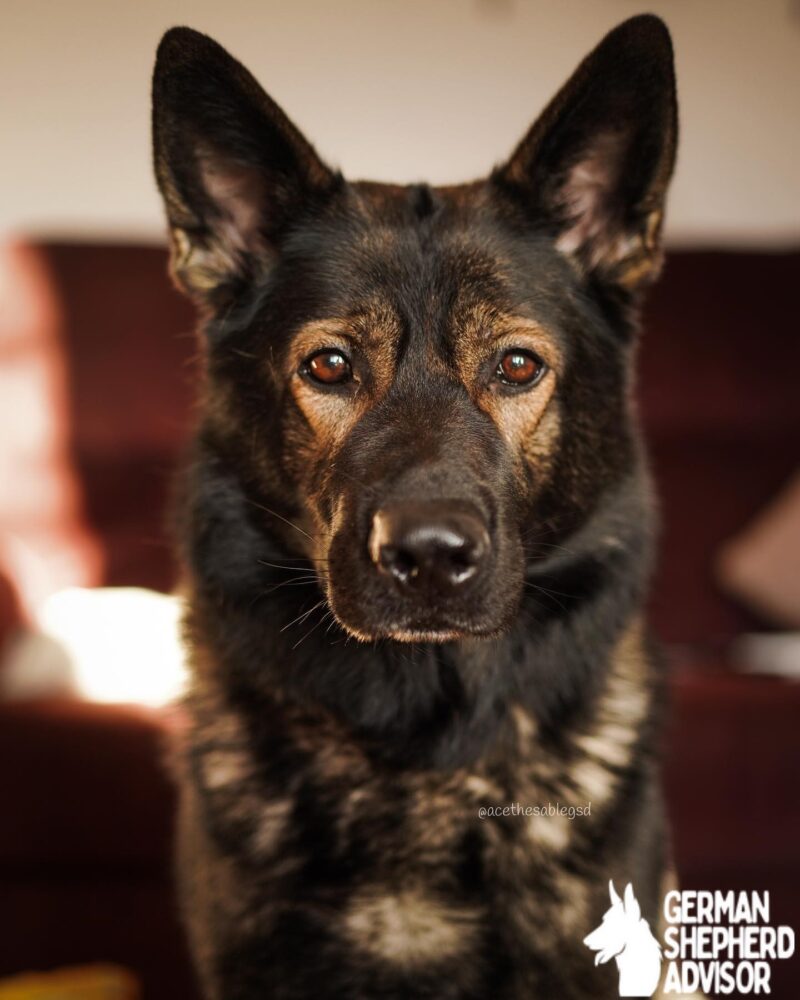
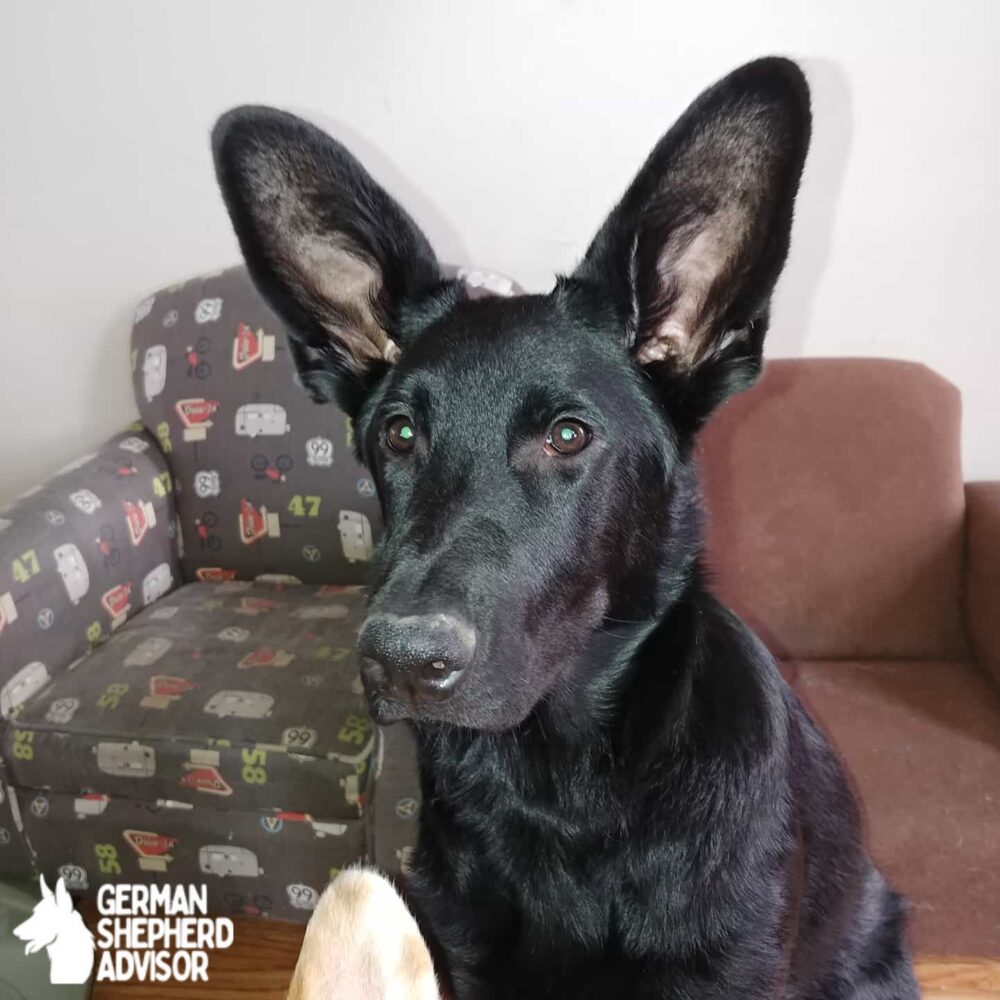
It is a large, strikingly beautiful dog, with the defining features of both parent breeds, that is known as a German Shepherd Newfoundland mix or New Shepherd. The precise state can depend on the precise canine; however, the following attributes are generally common:
Size and build
It is a bandy-legged behemoth, with an average weight of 80-150 pounds and a height 24-29 inches at the shoulder. The Newfoundland side gives them a big, heavy frame while the German Shepherd brings a more athletic, lean build.
Coat
- Thick double coat: Inherits a dense, double-layered coat from both parents, offering excellent insulation.
- Coat length: Can vary from medium to long, with a water-resistant quality if the Newfoundland’s traits dominate.
Coat colours
- Black (common with Newfoundland genes).
- Sable or tan with black markings (reminiscent of German Shepherds).
- Brown, gray, or bi-color patterns are also possible.
Facial features
- Head shape: A blend of the German Shepherd’s angular, noble face and the Newfoundland’s broader, softer expression.
- Ears: May stand erect like a German Shepherd or remain floppy like a Newfoundland.
- Eyes: Large, dark, and expressive, often exuding a gentle and intelligent gaze.
- Muzzle: Strong and proportional, sometimes broader due to Newfoundland influence.
Tail
- Long and bushy: The tail is typically thick and feathered, carried low or in a gentle curve.
- Newfoundland influence: May have a slightly rounded tip, useful for swimming.
Feet and paws
- Large, webbed paws: Often inherited from the Newfoundland, making this mix a natural swimmer.
- Strong pads: Designed for navigating rough terrain or icy conditions.
Variations in Appearance
As this is a mixed-breed, no two dogs are the same. They will be a reflection of both parents, which determines how they look. Each German Shepherd crossed with Newfoundland or Newfoundland crossed with German shepherd is unique, because even puppies of the same litter can differ in size, coat type and colour.
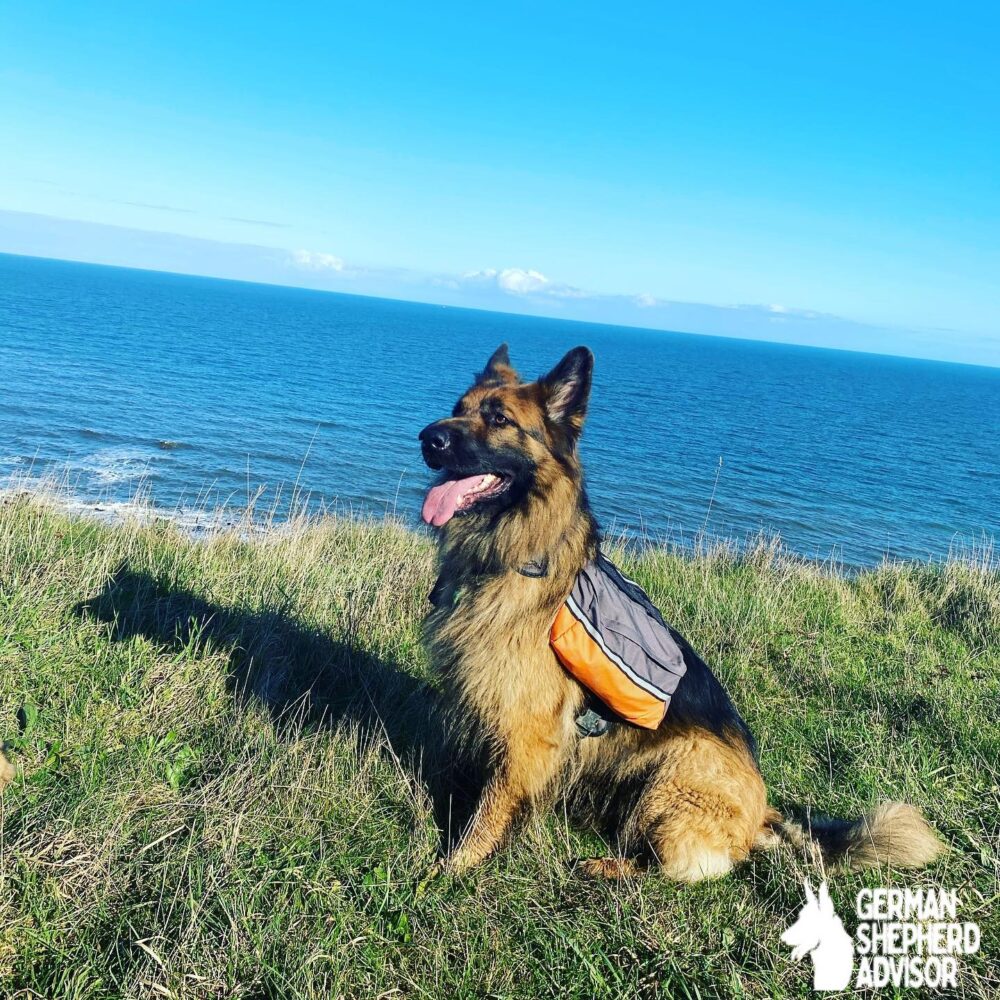
What is the temperament and personality of German Shepherd Newfoundland mix?

The German Shepherd Newfoundland mix is an affectionate, loyal, and intelligent dog that excels as a family companion. They are typically Gentle and Protective dogs. Combining the Newfoundland’s patience with the German Shepherd’s alertness, this hybrid is protective of its family while remaining gentle with children. Thanks to their German Shepherd lineage, these dogs are quick learners and eager to please. With proper socialization, they get along well with other pets and strangers, although they may be naturally wary of unfamiliar people.
Are German Shepherd and Newfoundland mixed dogs good with children and other pets?
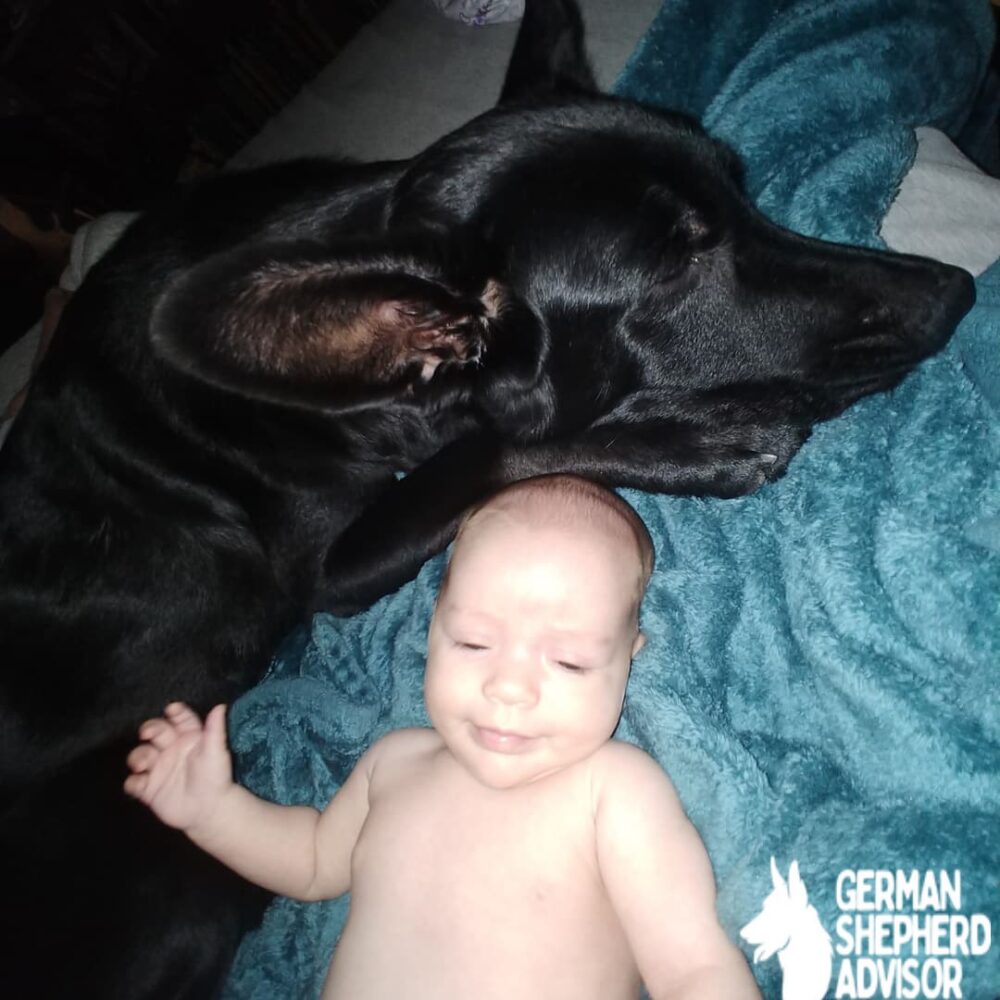
German shepherd Newfoundland mix puppies
German shepherd Newfoundland mix dogs combination is a large size dog mixture with strong white teeth which is good enough in chewing down the bones of one single prey whole at once time if it is required by them . These mixed dogs breed are known as efficient hunters, so they may also try to capture some living beings or small and medium-sized than themselves. German shepherd Newfoundland mix dogs can get aggressive if they’re not given enough of attention and their size means that they need at least a spacious garden to run around in. Newfoundlands german shepherd mix puppies are intelligent, strong and protective which makes them good watchdogs too.

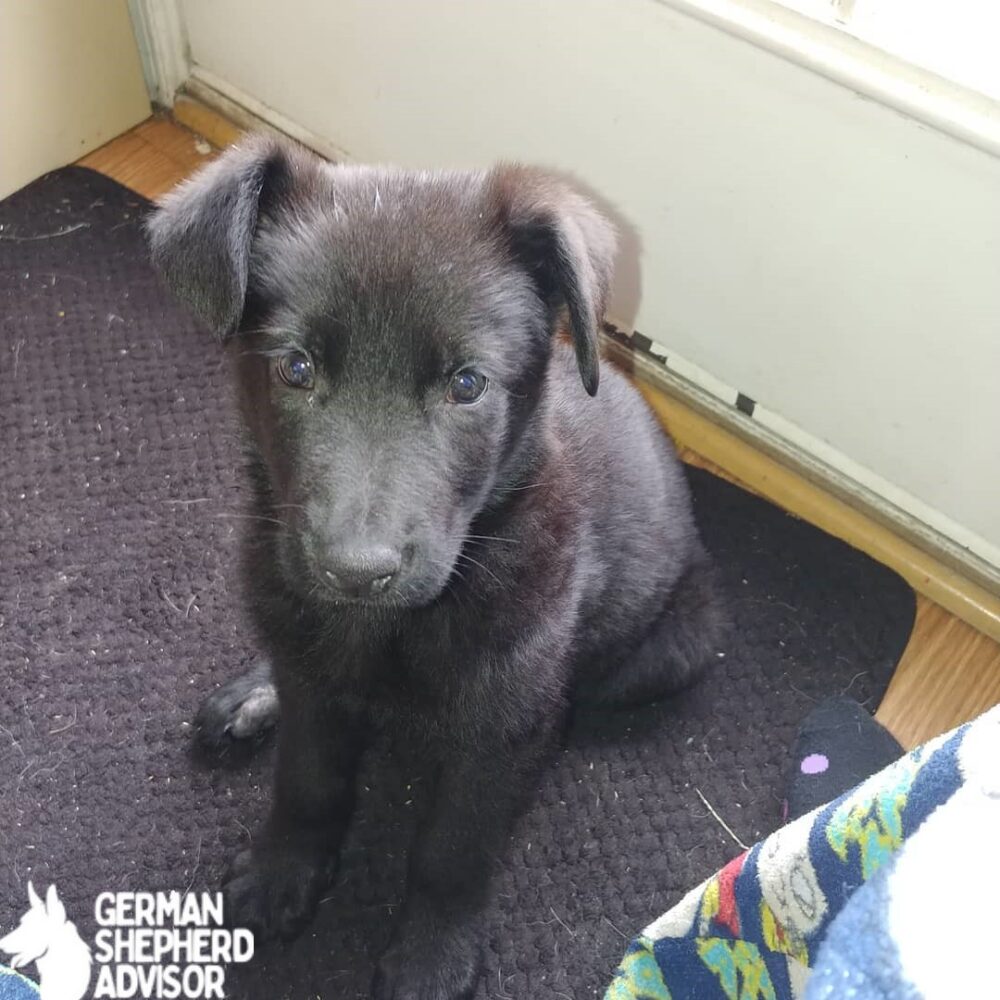
Newfoundland GSD mix dog trainers recommend the owners to get an understanding of these dogs before making them domesticated because it will be easier for both parties to understand one another when they interact on daily basis, so the training is better enforced by this manner. They will normally show signs of aggression through growling or barking in order to warn their owners in case there’s a stranger nearby but in cases, especially when they’re in a good mood and want to greet the stranger, they will jump up to them and put their paws on their shoulders. So, a Newfoundland GSD mix owner should be well aware of these behaviors in order to properly handle the dog.
Shepherd newfie mix
Shepherd Newfie mixes are great family dogs. They are gentle, intelligent, and loyal, making them the perfect companion for any home. These hybrids are also known for their athleticism and love of activity, so they’re perfect for families who enjoy being active outdoors. If you’re looking for a furry friend to join your family, a Shepherd Newfie mix may be the perfect pup for you!
Shepherd Newfie mixes are typically very healthy dogs. With proper care, they can live up to 13 years or more. Like all dogs, however, they require regular exercise, good nutrition, and routine veterinary care. Start training your new hybrid early and be sure to provide plenty of opportunities for play and exercise. This will help ensure that your pup grows up to be a well-behaved, happy dog.
If you’re ready to bring a Shepherd Newfie mix into your home, there are a few things you should know. First, hybrids can be quite expensive; typically, they cost anywhere from $500 to $1,000. Second, these dogs require a fair amount of space; they need at least an hour of exercise each day. Finally, it’s important to find a reputable breeder who screens their breeding stock for genetic health problems. By doing your research and taking the necessary precautions, you can ensure that your hybrid will lead a healthy and happy life.
German Shepherd and Newfoundland dog: Shepherd Newfie
Shepherd Newfie mixes are a hybrid dog breed that is a mix of the German Shepherd Dog and the Newfoundland. They are often referred to as Shepherd Newfie, or Newfies. These dogs make great family pets because they are gentle, intelligent, and loyal. They also have a strong desire to please their owners and are very easy to train. Shepherd Newfie mixes require plenty of exercise and need an hour of vigorous activity every day. They can be quite expensive, costing anywhere from $500 to $1,000. They also require a good amount of space – at least an hour per day of exercise is recommended. When purchasing a Shepherd Newfie mix, it is important to find a reputable.
Are newfoundlands aggressive?
Some people might think that Newfoundlands are aggressive dogs, but this is not true. They are actually very gentle and loving animals. In fact, they are one of the most docile dog breeds out there. While they may be big and bulky, they are not at all aggressive and make great family pets. So, if you are looking for a calm and mellow dog breed, the Newfoundland is definitely a good option.
Are newfoundlands aggressive? This is a question that many people have, and the answer is not always easy to determine. Generally speaking, Newfoundlands are not known to be aggressive dogs. However, there are always exceptions to the rule, and it is always important to remember that any dog can become aggressive if provoked or threatened.
If you are considering adding a Newfoundland to your family, it is important to do your research and learn as much as you can about these dogs before making a decision. It is also important to take into account the individual personality of each dog, as no two dogs are exactly alike.
If you already have a Newfoundland, be sure to provide him with plenty of training and socialization, and make sure that you are always in control of the situation. If your dog exhibits any signs of aggression, be sure to seek professional help from a qualified trainer or behaviorist.
Newfoundland full size
The Newfoundland is a large, sturdy dog with a sweet disposition and a love of water. He is a great choice for families with children and makes an excellent watchdog. This breed comes in two sizes: the standard Newfoundland and the giant Newfoundland. The standard Newfoundland typically weighs from 70 to 120 pounds, while the giant Newfoundland can weigh up to 200 pounds.
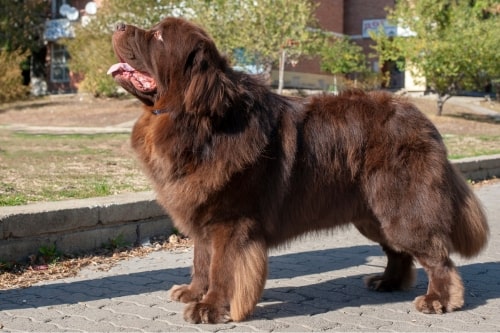
The Newfoundland’s coat is thick and waterproof, making him well-suited for cold. His hair can be black, brown, white, or black and white. The coat requires weekly brushing to prevent matting. The Newfoundland has a good temperament for children, but he is known to drool and slobber. A large yard or lakefront property is necessary if you own this breed because of his love of water and tendency to wander off the beaten path. This breed needs lots of company and isn’t happy left alone for long periods of time; however, some individuals are quite shy around strangers.
Fun Facts About the German Shepherd Newfoundland Mix
Who doesn’t love a cute German Shepherd? They are strong, protective, loyal and so much more. But for some people having just an ordinary German Shepherd isn’t enough. If you are looking for something different, then the German Shepherd Newfoundland mix might be the perfect option for you. While they do have certain similarities with both breeds, there are also many differences between them too. To find out if this type of dog is right for your family read on to learn more about what makes them unique.
One of the most noticeable characteristics about these dogs is their size . Their large muscular bodies make them look almost like small bears rather than dogs! Males usually weigh between 100 to 150 pounds while females can fall anywhere between the 100 to 125 pounds range. Because of their size, they can be quite clumsy especially when they are puppies . And because of this people with children should seriously consider whether or not an extra large dog is a good fit for their family. If it does work out, then you will definitely have one very happy and content pooch on your hands!
Breed Characteristics That They Tend to Inherit
While every dog is different, there are certain features that tend to be more common among German Shepherd Newfoundland mixes than others. We will now take a look at some of these characteristics so you can get an idea about what type of personality to expect from one of these dogs. One thing that to stand out between Newfoundlands and German Shepherds is their intelligence. While this isn’t always true if they are mixed with other breeds, many German Shepherd Newfoundland mixes have a knack for learning new things quickly.
But because of their intelligence, you will definitely need to make sure that you train them from an early age. This is especially important since they can also be easily distracted at times which can make training more difficult than it needs to be. But once you do get them trained properly, then you will find that they are very obedient and follow commands without hesitation. Another feature that these dogs often share is that of good health . They don’t suffer from any major genetic diseases or conditions.
Is German Shepherd Newfoundland mix easy to train?
If you’re the proud owner of a German shepherd Newfoundland mix, you’re likely to be wondering how best to train your new pet. Training is an essential part of dog ownership, and it’s especially important with a large and energetic breed like the GSD Newfoundland mix. There are many different ways to go about training your dog, but one of the most popular methods is positive reinforcement. With this approach, you reward your dog for good behaviour instead of punishing them for bad behaviour. This helps to create a positive relationship between you and your dog, and makes training more enjoyable for both of you.
Some basic commands that every dog should know include sit, stay, come, down, and heel. It’s a good idea to start training your dog with these commands as soon as possible. You can begin by teaching them in a quiet place such as your backyard, and then gradually move on to more challenging environments like busy streets and parks. Be patient when training your German shepherd Newfoundland mix, and remember to always praise them for their efforts. With a bit of patience and perseverance, you’ll have a well-trained dog that will make you proud.
Why are they easy to train?
Intelligence
German Shepherds are ranked among the most intelligent dog breeds and are known for their ability to quickly learn and execute commands. Newfoundlands are also smart and capable of understanding complex tasks, especially those involving teamwork or water rescue.
Eagerness to please owner
Both parent breeds are highly motivated by positive reinforcement, making them responsive to training.
Work ethic
German Shepherds thrive on having a job to do, while Newfoundlands have a history of being dependable working dogs. This combination creates a mix that enjoys learning and performing tasks.
Training tips for German Shepherd Newfoundland mix
- Start early:
- Begin training and socialization when the dog is a puppy to instill good behavior and reduce the chances of developing bad habits.
- Use positive reinforcement:
- Reward-based training with treats, praise, or toys works best. Avoid harsh corrections, as they can lead to fear or stubbornness.
- Be consistent:
- Use consistent commands and routines to avoid confusing the dog.
- Short and engaging sessions:
- These dogs are intelligent but can get bored with repetitive tasks. Keep training sessions short (10-15 minutes) and varied.
- Address potential challenges:
- The Newfoundland’s laid-back personality may sometimes cause stubbornness, while the German Shepherd’s high energy might require more focus. Patience and persistence are key.
- Mental stimulation:
- Engage them in puzzle games, obedience training, or agility courses to keep their minds sharp.
- Socialization:
- Expose them to various environments, people, and other animals early on to ensure they grow into confident, well-rounded adults.
How much exercise does a German Shepherd Newfoundland mix need?
German Shepherd mixed with Newfoundland needs about 60 to 90 minutes of daily exercise to keep healthy, fit, and mentally stimulated. However, the precise quantity can differ depending on the age, energy level, and traits it inherits from its parent breeds of the dog. Joint issues or other health problems common among giant breeds, including hip dysplasia, might necessitate adjusted workouts. Activities of a lower impact, such as swimming, are best.
These pups make the perfect buddy for adventure seekers. Hikes lasting a long time or jogs moving at a moderate pace are great for their endurance. Exercise in the morning or evening in hot temperatures and provide water. In cooler weather their heavy coat makes outdoor activities more pleasant, though be alert for symptoms of severe cold. You should look for signs of lack of exercise such as restlessness, excessive barking, or destructive behavior.
The German Shepherd Newfoundland mix is another versatile and active dog that would do great with both physical and mental exercise. Invested 60-90 minutes a day in stimulating pursuits, you’ll be boosting your dog’s health, happiness, and good behavior. For best results, adapt their exercise routine for their age, energy level and health needs.
This mix requires ample physical and mental activity to stay happy and healthy:
- Daily exercise: Aim for at least 60-90 minutes of exercise, including long walks, hikes, or swimming sessions.
- Playtime: Engage them in activities like fetch or tug-of-war.
- Mental stimulation: Use puzzle toys or involve them in canine sports to challenge their intelligence.
What is the lifespan of a German Shepherd Newfoundland mix?
With proper care, this mix has an average lifespan of 9-12 years.
What are the grooming requirements for German Shepherd Newfoundland mix?
The German Shepherd Newfoundland mix has a thick coat that requires regular maintenance:
- Brushing: Brush 2-3 times per week to manage shedding and prevent matting.
- Bathing: Bathe every 6-8 weeks or as needed, especially if they’re prone to outdoor adventures.
- Other Grooming: Trim nails, clean ears, and brush their teeth regularly to maintain overall health.
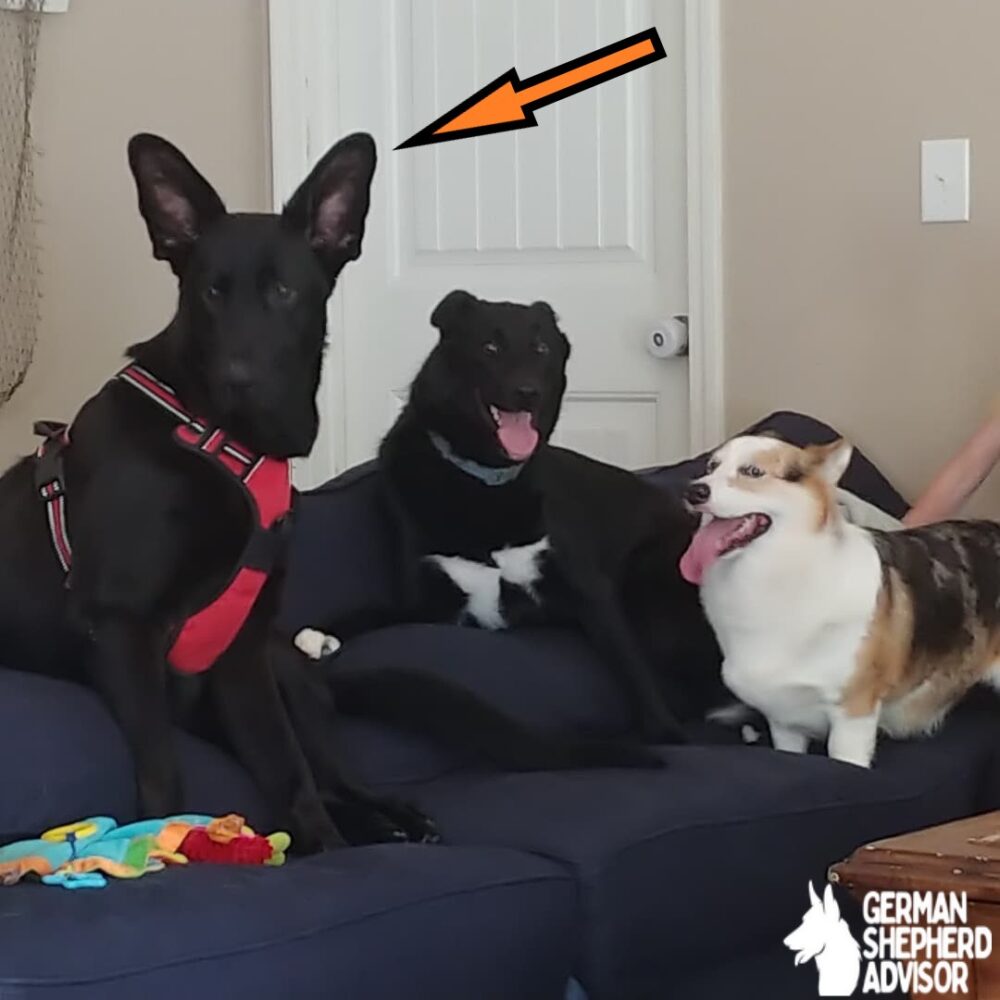
What are the common health conditions of a German Shepherd Newfoundland mix?
The German Shepherd Newfoundland mix can inherit health issues from either parent breed. Being a large breed hybrid, they are prone to certain health conditions common to both German Shepherds and Newfoundlands.
Below is a breakdown of serious and minor health conditions to watch for:
Hip and Elbow Dysplasia
A genetic condition where the hip or elbow joints don’t develop properly, leading to arthritis and mobility issues. Limping, stiffness, difficulty rising, reluctance to climb stairs are the main symptoms. Maintain a healthy weight, provide joint supplements, and consider surgery in severe cases.
Bloat (Gastric Dilatation-Volvulus)
A life-threatening condition where the stomach twists and traps gas, cutting off blood flow. Swollen abdomen, restlessness, drooling, attempts to vomit without success are the main symptoms. Feed smaller, frequent meals and avoid vigorous exercise immediately before or after eating. Emergency surgery is required if it occurs.
Subaortic Stenosis (SAS)
A heart condition commonly seen in Newfoundlands, where the heart’s aortic valve narrows, restricting blood flow. Fainting, lethargy, and exercise intolerance are the main symptoms. Regular vet checkups to monitor heart health. Severe cases may require medication or lifestyle adjustments.
Degenerative Myelopathy
A progressive spinal cord disease commonly seen in German Shepherds, leading to loss of mobility in the hind legs. Weakness in hind limbs, difficulty walking, dragging of paws are the main symptoms. No cure, but physical therapy can help improve quality of life.
Addison’s disease
A hormonal disorder caused by adrenal gland dysfunction. Lethargy, vomiting, diarrhea, and weight loss are the main symptoms. Regular vet monitoring and lifelong hormone replacement therapy.
Skin allergies
Sensitivity to environmental factors, food, or parasites, leading to skin irritation. Itching, redness, hot spots, and excessive scratching are the main symptoms. Manage with a hypoallergenic diet, flea control, and medicated shampoos.
Ear infections
Floppy or partially floppy ears may trap moisture, leading to infections. Head shaking, redness, discharge, and foul odor from ears are the main symptoms. Regular ear cleaning and monitoring for signs of infection.
Obesity
Overeating or lack of exercise can lead to obesity, which exacerbates joint and heart issues. Excessive weight gain, reduced stamina, and difficulty moving are the main symptoms. Provide a balanced diet and ensure regular exercise.
Eye Issues (Cataracts and Entropion)
Cataracts or Cloudiness in the lens, impairing vision. A condition where the eyelid rolls inward, irritating the eye. Squinting, tearing, or visible cloudiness in the eyes are the main symptoms. Routine eye exams and, if necessary, corrective surgery.
Hypothyroidism
An underactive thyroid gland leading to a slower metabolism. Weight gain, lethargy, and hair loss are the main symptoms. Lifelong thyroid hormone replacement therapy.
Is German Shepherd Newfoundland mix the right dog for you?
Before adopting or purchasing a German Shepherd Newfoundland mix, consider the following:
- Space needs: These large dogs thrive in homes with ample space or a yard.
- Owner experience: While adaptable, they are better suited for experienced dog owners who can manage their training and care needs.
- Commitment: Be prepared for a long-term investment in time, energy, and finances for grooming, food, and veterinary care.
Where to buy or adopt German Shepherd Newfoundland mix?
If this mix feels like the right fit for you, here’s how to find one:
- Adoption: Check local shelters or rescue organizations specializing in large breeds.
- Reputable dog breeders: Look for reputable dog breeders who perform health screenings for genetic conditions in both parent breeds.
- Avoid puppy Mills: Ensure ethical practices by asking for health records and meeting the puppy’s parents.
Frequently asked questions (FAQs)
These dogs are large and typically stand 24-29 inches tall at the shoulder. Their weight can range from 80 to 150 pounds, depending on the genetics of the individual dog.
Yes! They are affectionate, gentle, and protective, making them excellent companions for families, including those with children. However, supervision is recommended around small children due to the dog’s large size.
Yes, these dogs are heavy shedders due to their thick, double-layered coats. Regular brushing (2-3 times a week) helps manage shedding and keep their coats healthy.
Yes, if properly socialized from a young age, they can get along well with other dogs and pets. Early exposure and training are crucial for developing good social behavior.
Not typically. Due to their large size and high energy levels, they do better in homes with plenty of space and access to outdoor areas.
A high-quality diet formulated for large, active breeds is ideal. It should include plenty of protein, healthy fats, and joint-supporting nutrients like glucosamine. Feeding them in multiple smaller meals can help prevent bloat.
Yes! Thanks to the Newfoundland genes, many German Shepherd Newfoundland mixes are natural swimmers and love water activities.
They can be, as they form strong bonds with their families. Gradual training, plenty of mental stimulation, and not leaving them alone for extended periods can help reduce anxiety.
Conclusion
The German Shepherd Newfoundland mix is a loyal, intelligent, and affectionate companion that combines the best traits of both parent breeds. Whether you’re looking for a protective family dog, a gentle playmate for kids, or an active partner for outdoor adventures, this mix can be a perfect match. The newfoundland mixed with German shepherd is a majestic and imposing dog, combining the regal presence of the German Shepherd with the soft, endearing qualities of the Newfoundland. Their physical appearance often reflects a perfect balance of strength, grace, and gentleness.
Do you own a newfoundland and German shepherd mix (German Shepherd Newfoundland mix) or have questions about this breed? Share your thoughts in the comments below—we’d love to hear from you!

